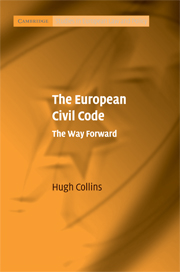Book contents
- Frontmatter
- Contents
- Preface
- Series editors' Preface
- Table of cases
- Table of treaties and legislation
- I Civil society and political union
- II The acquis communautaire in private law
- III The hidden code
- IV Private law and the Economic Constitution
- V Cultural diversity and European identity
- VI Respecting legal diversity
- VII Multi-level private law
- VIII Strengthening convergence
- IX Exploring the European Social Model
- Index
- CAMBRIDGE STUDIES IN EUROPEAN LAW AND POLICY
- References
IV - Private law and the Economic Constitution
Published online by Cambridge University Press: 26 February 2010
- Frontmatter
- Contents
- Preface
- Series editors' Preface
- Table of cases
- Table of treaties and legislation
- I Civil society and political union
- II The acquis communautaire in private law
- III The hidden code
- IV Private law and the Economic Constitution
- V Cultural diversity and European identity
- VI Respecting legal diversity
- VII Multi-level private law
- VIII Strengthening convergence
- IX Exploring the European Social Model
- Index
- CAMBRIDGE STUDIES IN EUROPEAN LAW AND POLICY
- References
Summary
At the end of the Cold War, in about 1989, the sharp and mutually reinforcing clash between capitalism and communism that had divided Europe for half a century lost its magnetic force on politics. Presented with a choice over the type of social and political order, citizens of former Eastern bloc countries opted to join the European club. They believed that the European Community offered both liberal democratic political institutions and a social model that controlled the market economy for the purpose of general welfare. Most importantly, the Community seemed to have found a way to avoid the damaging extremes of either unrestrained market capitalism or totalitarian communism.
Yet the European Community, as it had developed till then, could not fulfil that promise of setting a framework of laws and institutions that would secure a European social democratic model. In Europe's multi-level system of government, Member States retained control over crucial elements in this model. It was national constitutions that sustained and guaranteed liberal democracy. Even for the international protection of human rights, it was a different organisation, the Council of Europe, and not the European Community, which provided legal guarantees. Similarly, national laws and welfare systems performed the bulk of the tasks of securing social justice and social inclusion for citizens with only marginal inputs from the European Community such as regional support funds.
- Type
- Chapter
- Information
- The European Civil CodeThe Way Forward, pp. 91 - 123Publisher: Cambridge University PressPrint publication year: 2008



